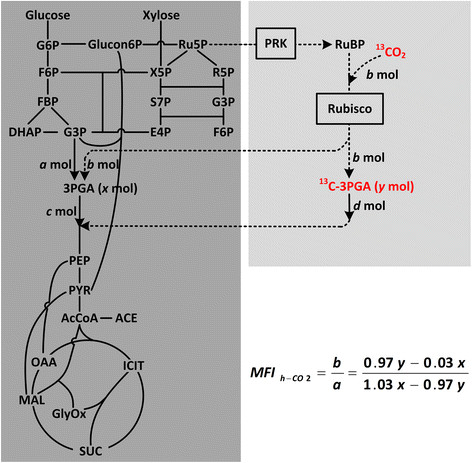中科院微生物所研究实现在大肠杆菌中碳浓缩固碳

将CO2转化为燃料或化学品,是实现CO2的资源化利用、缓解资源能源短缺和温室效应的一种途径。经遗传改造的蓝细菌或者藻类等光合自养微生物,可以将CO2转化为包括乙醇、丁醇、丙酮、异丁醛、乳酸等在内的数十种化学品,但由于自养生物生长速度慢,CO2生物转化为这些化学品的效率还比较低。
异养生物可以通过磷酸烯醇式丙酮酸羧化酶等自有途径固定CO2,但目前尚不清楚光合生物的固碳途径是否能在异养生物中发挥作用,效率如何。如果能够在异养生物酵解途径的基础上引入额外的固碳途径并发挥功能,则有可能为目标代谢产物的生产提供额外的碳架来源。
从这一假设出发,中国科学院微生物研究所李寅课题组在大肠杆菌中导入了卡尔文循环中的磷酸核酮糖激酶和核酮糖-1,5-二磷酸羧化酶/加氧酶,发现可以在大肠杆菌的中央代谢中固定额外的CO2。采用基于13C的定量分析发现,CO2的供给是大肠杆菌异养固碳的限速步骤。进一步引入蓝细菌特有的碳浓缩机制,大肠杆菌中央代谢的固碳速率可以达到22.5 mg CO2 g DCW-1 h-1,与十四种蓝细菌和藻类的固碳速率(3.5-23.7 mg CO2 g DCW-1 h-1)相当,实现了蓝细菌固碳和碳浓缩机制在异养生物中的重编程,为进一步提高异养生物固碳效率奠定了基础。
这些结果已于6月18日在Biotechnology for Biofuels 在线发表,李寅课题组的博士生巩伏雨为该文章的第一作者。副研究员蔡真和研究员李寅为该文的共同通讯作者。该研究得到了国家科技部“973计划”和国家自然基金的资助。(来源:生物360)
Quantitative analysis of an engineered CO2-fixing Escherichia coli reveals great potential of heterotrophic CO2 fixation
Abstract Background Production of fuels from the abundant and wasteful CO2 is a promising approach to reduce carbon emission and consumption of fossil fuels. Autotrophic microbes naturally assimilate CO2 using energy from light, hydrogen, and/or sulfur. However, their slow growth rates call for investigation of the possibility of heterotrophic CO2 fixation. Although preliminary research has suggested that CO2 fixation in heterotrophic microbes is feasible after incorporation of a CO2-fixing bypass into the central carbon metabolic pathway, it remains unclear how much and how efficient that CO2 can be fixed by a heterotrophic microbe.
Results A simple metabolic flux index was developed to indicate the relative strength of the CO2-fixation flux. When two sequential enzymes of the cyanobacterial Calvin cycle were incorporated into an E. coli strain, the flux of the CO2-fixing bypass pathway accounts for 13 % of that of the central carbon metabolic pathway. The value was increased to 17 % when the carbonic anhydrase involved in the cyanobacterial carbon concentrating mechanism was introduced, indicating that low intracellular CO2 concentration is one limiting factor for CO2 fixation in E. coli. The engineered CO2-fixing E. coli with carbonic anhydrase was able to fix CO2 at a rate of 19.6 mg CO2 L −1 h −1 or the specific rate of 22.5 mg CO2 g DCW −1 h −1 . This CO2-fixation rate is comparable with the reported rates of 14 autotrophic cyanobacteria and algae (10.5–147.0 mg CO2 L −1 h −1 or the specific rates of 3.5–23.7 mg CO2 g DCW −1 h −1 ).
Conclusions The ability of CO2 fixation was created and improved in E. coli by incorporating partial cyanobacterial Calvin cycle and carbon concentrating mechanism, respectively. Quantitative analysis revealed that the CO2-fixation rate of this strain is comparable with that of the autotrophic cyanobacteria and algae, demonstrating great potential of heterotrophic CO2 fixation.
原文链接:http://www.biotechnologyforbiofuels.com/content/pdf/s13068-015-0268-1.pdf

